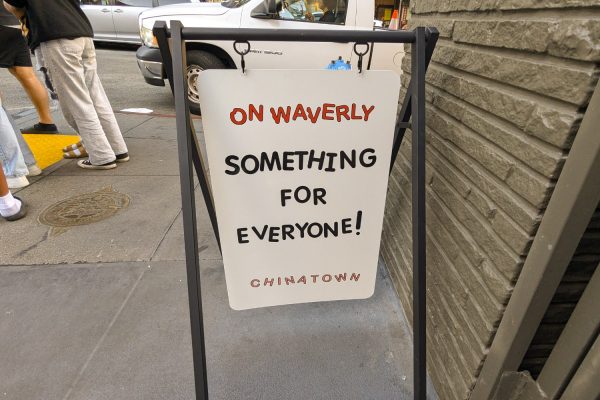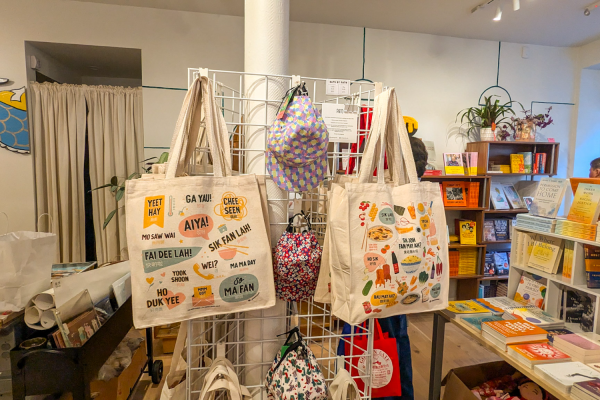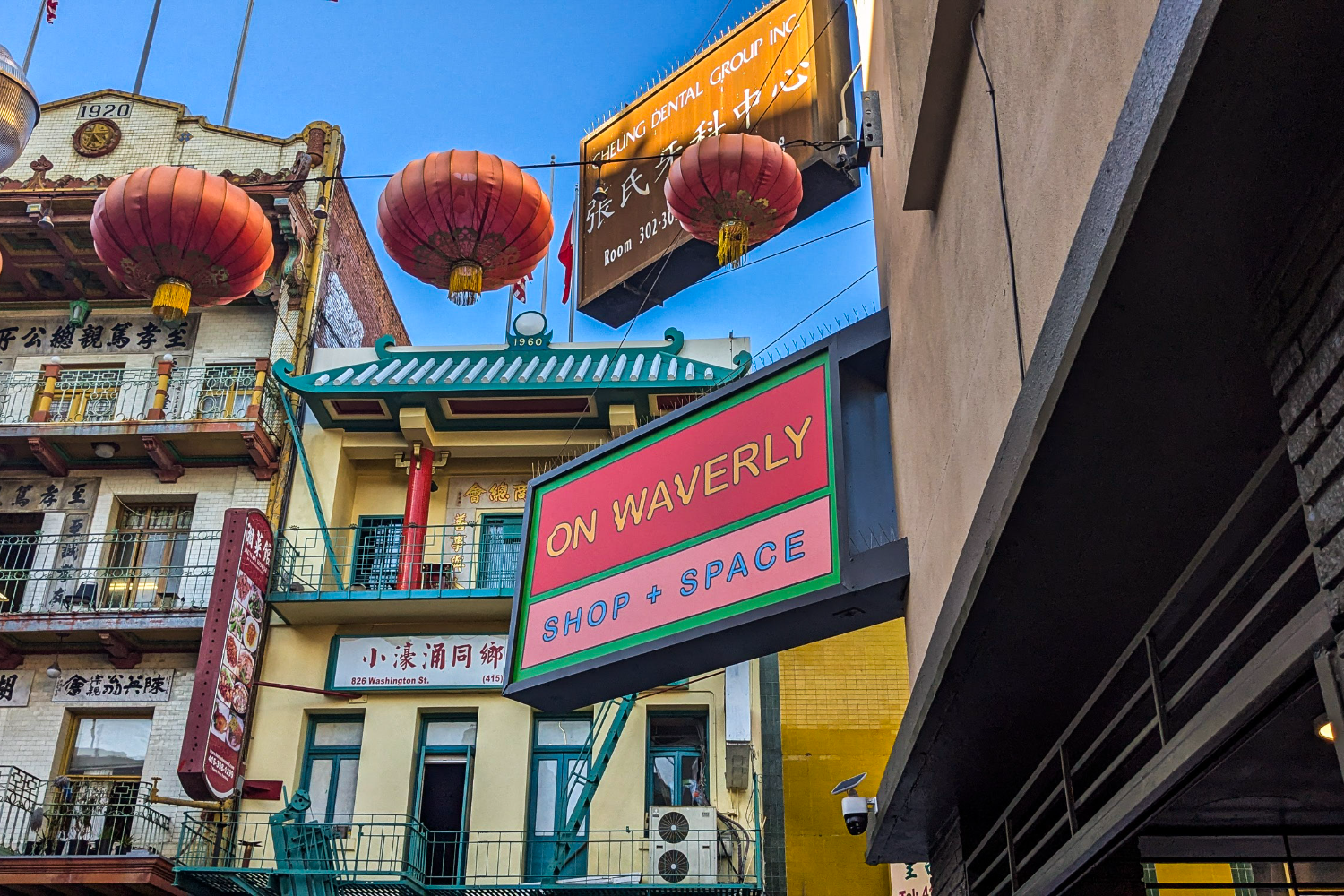An enticing bright red sign lies above a building located on the corner of Waverly Place in San Francisco. As the doors open and people from all walks of life come in, a sense of togetherness and warmth fills the room with the collection of people coming to celebrate and connect.
Cynthia and Jennifer Huie, two sisters who founded the small business On Waverly in San Francisco, have curated a safe space for Asian American and Pacific Islander (AAPI) creators and artists to express themselves freely.
The small business, which started in 2023, began when the sisters’ goal was to have a new take on San Francisco’s Chinatown’s rich community and to bring awareness of the culture and historic atmosphere around them in today’s world.
“I really wanted to specifically target AAPI identifying folks who perhaps were connected to Chinatown at some point, or had some sort of feeling of wanting to connect within a greater AAPI community,” Cynthia Huie said. “I wanted them to come back into Chinatown and experience what it was like in the present.”

With Cynthia Huie’s background in other small businesses and fashion, she had experience working on starting her own business, so when the opportunity presented itself to open On Waverly, she took it.
“I’ve found that instead of picking goals that I think I should achieve, I’m just letting doors of opportunity open and then deciding if I’ll walk through that door and see what emerges from that. In terms of this shop, it’s like the community was super supportive, the artists have been super supportive, and I already had a skill set to be able to do it,” Cynthia Huie said.
However, before creating the idea of On Waverly, they knew that feeling out of the area and what Chinatown needed was vital for their business to be successful.
“I thought it was important to at least come in first and see how we want to be involved with Chinatown. So for several years, I was involved in other types of volunteer efforts, like working on projects with the Chinese Historical Society and just getting to know the lay of the land and getting to know who was in Chinatown, what were the needs, and how could I give to the community with my skill set,” Cynthia Huie said.
Chinatown in San Francisco is very historical, with many immigrants who came centuries ago influencing San Francisco as it is seen today. Chinese people who immigrated also went through many difficulties, including discrimination and lack of money, which shows how far they have come not just in San Francisco but in America.
At first glance, the store is filled with vibrancy and color, making it an inviting space for all. The store is also relatively large, with sections focusing on specific types of products. The store sells many items, including books, cards, pins, stickers, plushies, jewelry, and much more, to give the perspective of the AAPI community coming together.
However, what differentiates On Waverly from other stores is that they don’t really sell any of their own products, and instead sell products from other AAPI creators and small businesses, in general. This is to shape the AAPI experience, as well as introduce other small companies that aren’t identified with the AAPI community. It promotes a sense of everyone being together and not excluding anyone.
“Primarily, we call ourselves an AAPI-centered shop, and so the vast majority of makers, authors, artists, are Asian American and Pacific Islander identifying, but it’s not 100%. I think that’s really important to understand because it’s not an exclusionary kind of place,” Cynthia Huie said.
Other small businesses, not even limited to America, give some of their products to On Waverly to sell, making them diverse and unique. It also allows On Waverly to not be specific to one part or culture of the AAPI community and instead introduces people to all aspects of it.
Christine Chee, a co-owner of a small business called I’ll Know It When I See It, located in Vancouver, Canada, describes her experience working with On Waverly and their inspiring message.
“We love what they’re doing. Creating a platform or a way to highlight Asian artists and creatives and also all of the community work that they do supporting Chinatown,” Chee said.

The sisters also wanted a space where AAPI conversations could be held and talked about to have the community come together to discuss different cultures or traditions within the AAPI community, so they decided to have creators and members of the AAPI community be a part of events where discussions are held, as well as promotion for the creators that they work with.
It was essential for them to make sure that there was somewhere where not-so-talked-about topics relating to AAPI culture could be expressed, so they currently host many events throughout the months with AAPI talks and discussions to engage the community into action.
“This past year, in May, they hosted us at their shop. We did a pop-up in May, which was really nice of them,” Chee said.
Especially after the pandemic, small businesses have had issues trying to stay up and running. Also, with San Francisco known for having a high population of homeless people and crime, it’s hard to have a successful business in the area. But for the Huie sisters and On Waverly, keeping their store up and running hasn’t been a problem.
“I think so far, we’ve been okay navigating most issues,” Cynthia Huie said.
A small business requires persistent action and sacrifice to make a well-oiled machine. With On Waverly, what drives them forward is their opportunity for new events and the creative pathways they will take in the future with their shop.
“I think it takes a lot of resourcefulness and flexibility. So I think if you’re the type of person who obviously loves to work hard, you have a strong drive to solve problems to think creatively. Those are really basic things to be successful in a small business,” Cynthia Huie said.
As for now, On Waverly continues to inspire the Chinatown community by hosting weekly events and discussions, embracing their store as a place for all to celebrate themselves, and continuing the legacy of a town with a very influential past.
“Beyond what I eat, what I do, how my family got here, with all these things, there are other things and other interests that are more important to this community, and I think that’s where the representation is really important. That we inspire others to be able to travel along different paths but also be comfortable with themselves,” Cynthia Huie said.



